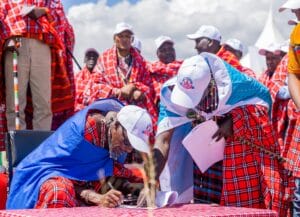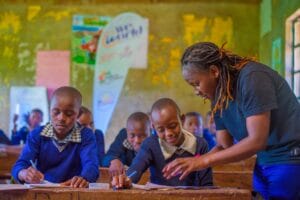
In Syria, the protracted crisis that began in 2011 has profoundly affected every aspect of society, including the education sector. The damage to school infrastructure, lack of resources, and ongoing electricity shortages has significantly disrupted education at all levels. Those most affected by this situation are young people with disabilities, who face additional challenges in accessing quality education, especially vocational education.
In response to this, WeWorld, with the support of the Italian Cooperation, has been working to enhance education and social inclusion in the Deir-ez-Zor and Aleppo Governorates, through a series of interventions: from providing vocational training opportunities for youth with disabilities and their caregivers, to rehabilitating schools, equipping them with essential tools, and installing solar energy systems to tackle power shortages. This initiative is giving hope to a generation of young people who have grown up amidst the crisis, helping them acquire the skills necessary to contribute to Syria’s early recovery.

Enhancing Inclusivity in Vocational Education
One of the critical components of this initiative is the focus on the inclusion of youth with disabilities in vocational training programs, also through the awareness building of teachers and community members.


The story of Tahani Al-Hamada, a teacher at the Daham Al-Mustafa Vocational School in the Harabesh neighborhood of Deir ez-Zor, illustrates the importance of this approach. Thanks to the of our project funded by the Italian Cooperation, the school where Tahani works has been rehabilitated, equipped with modern tools, and provided with a solar energy system to meet its electricity needs.
Tahani participated in a capacity-building course for teachers, foreseen by the project, which focused on inclusive education, life skills, early marriage, gender equality, and health awareness. The training aimed to empower teachers with the knowledge and skills needed to effectively integrate students with disabilities into their classrooms. Tahani emphasized the profound impact that the training had on both educators and students, particularly in terms of changing societal attitudes towards people with disabilities.

"The capacity-building course helped us discover the skills that these students possess, which were often overlooked because of the marginalization they face."
Tahani’s experience underscores the importance of training educators to recognize and nurture the potential of students with disabilities. By equipping teachers with the tools and understanding needed to create inclusive learning environments, the project helps to break down barriers and open up new opportunities for these students.
The story of Ahmed Jamal Al-Haddo, a 22-year-old electronics enthusiast from Deir ez-Zor who joined one of the project’s Vocational Training, is one of the most inspiring. From a young age, Ahmed was fascinated by electronics and dreamed of pursuing a career in the field. However, his life changed dramatically when a shell hit his neighborhood during the siege of Deir ez-Zor, resulting in the amputation of both his legs below the knees. After receiving treatment in Damascus, Ahmed faced immense physical and emotional challenges, including times of loneliness and despair, leading even to contemplating suicide in the darkest moments.
Despite these immense hardships, Ahmed refused to give up. He found strength by practicing sports, and became a national champion in powerlifting, managing to lift 120 kilograms and also competing in shot put. His determination to succeed did not stop there. Thanks to the vocational training program organized by WeWorld, Ahmed was able to pursue his passion for electronics.

Ahmed participated in a month-long electronics training program at the Daham Al-Mustafa Vocational School, where he was one of 75 trainees. The training not only helped him develop technical skills but also gave him a renewed sense of hope and purpose.
"I want to continue improving my skills so that I can work in electronics and help others, especially those with disabilities".
His story is a testament to the power of resilience and the transformative impact of vocational training on young people’s lives.
Moreover, the project is helping to change societal perceptions of people with disabilities through capacity-building with teachers and awareness campaigns at community level.
As Syria tries to recover, vocational training programs like this one will play a vital role in shaping the future of young generations. By empowering youth with disabilities and providing them with the skills they need to make a decent living, the project is helping to create a more inclusive and hopeful future for all.


